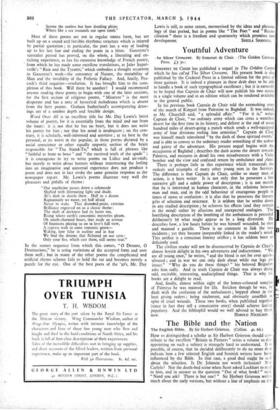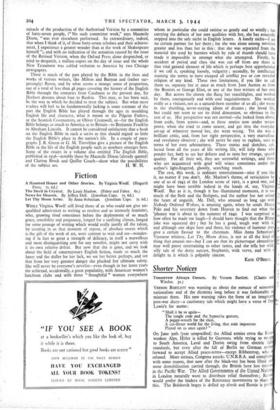The Bible and the Nation
The English Bible. By Sir Herbert Grierson. (Collins. 4s. 6d.) How so distinguished a scholar as Sir Herbert Grierson should con- tribute to the excellent " Britain in Pictures " series a volume so dis- appointing on such a subject is strangely hard to understand. It is possible, of course, that he decided deliberately to do no more th indicate how a. few selected English and Scottish writers have been influenced by the Bible. In that case, a good deal might be sa d about the selection. Is Dr: Johnson not worth inclusion? N Carlyle? Nor the death-bed scene when Scott asked Lockhart to reed to him, and in answer to the question "Out of what book? " said, " Need you ask? There is but one! " Sir Herbert Grierson writes much about the early versions, but without a line of emphasis on the
miracle of the production of the Authorised Version by a committee of forty-seven people, (" No such committee work," says Macneile Dixon, " was ever elsewhere performed. So extraordinary, indeed, that when I think of it, of those forty-seven scholars and their achieve- ment, I experience a greater wonder than at the work of Shakespeare himself "), and with no indication of the sensation caused by the issue of the Revised Version, when the Oxford Press alone despatched, or tried to despatch, a million copies on the day of issue and the whole New Testament was cabled verbatim to America by two Chicago newspapers.
There is much of the part played by the Bible in the lives and works of various writers, like Milton and Bunyan and (rather sur- prisingly) Byron, and by what seems a strange sense of proportion, out of a total of less than 48 pages covering the history of the English Bible through the centuries from Caedmon to the present day, Sir Herbert devotes about four to Ruskin. This may, as has been said, be the way in which he decided to treat the subject. But what most readers will feel to be fundamentally lacking is some estimate of the part the English Bible has played through the ages in moulding English life and character, what it meant to the Pilgrim Fathers, or the Scottish Covenanters, or Oliver Cromwell, or—for the English Bible belongs as much to America as to Britain—to Benjamin Franklin or Abraham Lincoln. It cannot be considered satisfactory that a book on the English Bible in such a series as this should regard so little the English Bible's place in the nation's life. In a couple of para- graphs J. R. Green or G. M. Trevelyian give a picture of the English Bible in the life of the English people such as nowhere emerges here. Some of the essays in a volume also entitled The English Bible, published in 1936—notably those by Macneile Dixon (already quoted) and Clutton Brock and Quiller Couch—show what the possibilities



























 Previous page
Previous page